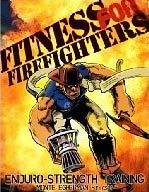 |
Editor’s Note: As part of our coverage for National Firefighter Health Week, which runs Aug. 17-21, personal trainer Michael Krueger takes a look in the following article at the unique fitness challenges firefighters face. For more resources on firefighter health, visit our Health and Wellness section and the NVFC’s special Health Week page.
By Michael Krueger, NSCA-CPT
Imagine for a moment that you are a professional athlete.
Your sport is a little different from what you watch on ESPN. On game day you don’t know exactly what time you are going to play; it may be in the middle of the night, the afternoon, or both for that matter. You don’t know exactly what the game plan is, because you have yet to know who your opponent will be, or who is going to be involved. The weather may be hot, or cold, wet or dry.
It may take place indoors or out, or both. You have no idea how long it is going to take to finish and you may even have another game start before you have completed this one. Your opponent doesn’t play by any rules … and someone may die.
Welcome to the world of the firefighter, the ultimate athlete.
Training for this “sport” can be complicated. Many people don’t understand the physical demands placed on firefighters. Fighting fires is deadly serious business; it doesn’t have time outs, or referees to make sure nothing gets out of control and it doesn’t forgive the unprepared.
You train to mitigate the risks that you are sure to face. Your fitness cannot be a liability, it must be on par with the skills you have spent so much time learning, so that when the game begins you are ready to play. To be ready, you must be training like a firefighter. Too many firefighters train like bodybuilders or like the athletes that they may have been in high school or college. You don’t train like a football player to play baseball nor would you train like a swimmer to be a firefighter.
Look at what a firefighter needs to do and then you can train in a way to specifically address those needs. That means working to acquire extreme levels of cardio vascular, muscular and metabolic endurance. You need the ability to go full throttle for 30, 40 or 60 minutes. You need to be able to recover quickly so that you can get back in the game. Some water, a new bottle of air and you are good to go.
More on the ‘Firefighter Athlete':
Check out Chief Monte Egherman’s book ‘Fitness for Firefighters’ available online. |
Firefighters aren’t like everybody else. The commonplace definitions of fitness don’t apply. Normal or average has no meaning when looked at in the context of what you are required to do.
Chaotic situations
Who else is expected to get out of bed in the middle of the night, jump into a truck, arrive at the scene of some tragedy, put on 60 or 70 pounds of equipment, correctly assess a chaotic situation and then perform your job flawlessly in a dangerous and ever shifting environment, all in a matter of minutes?
To go into this scenario with less than optimal fitness would be sheer folly, yet many firefighters do just that, and statistically every third day one of them loses their life in the line of duty; don’t let this happen to you.
You are the most important piece of “equipment” that your department has, you have an obligation to train and maintain it so that it is prepared for peak performance at all times.
You need to train specifically for your chosen profession. Just exercising isn’t enough; it is a beginning, but you need to train properly so that you can successfully face the demands of your job. Big showy muscles or the ability to compete in a triathlon won’t necessarily give you the proper strength and endurance to get the job done on the fire line and live to tell about it.
Train your metabolism so that you will be able to work long and hard while maintaining the mental sharpness that is so important to everyone’s survival. Teach your body to process the waste products that come from working muscles; you need to be able to do your job and recover quickly so that you can be an effective part of the team rather than a liability. You can’t afford to be slowing down at that decisive moment when lives are on the line. This is what being “firefighter fit” is all about.
So get in the game; learn how to train to achieve that ultimate level of fitness, the life it saves may be your own, your brother or sister, or someone in your community. So do the right thing. It’s a win-win for everyone.
Michael Krueger is an independent personal trainer in Madison, Wisconsin. He is certified by the National Strength and Conditioning Association. He received his introduction to fitness training while serving in the U.S. Coast Guard. He has provided some nutrition and fitness training counseling to the Fitchburg, Wis., Fire Department based on his understanding of the risks and demands involved in firefighting, which he had gained though his military experience. You can contact Michael at kruegermcn@charter.net.



